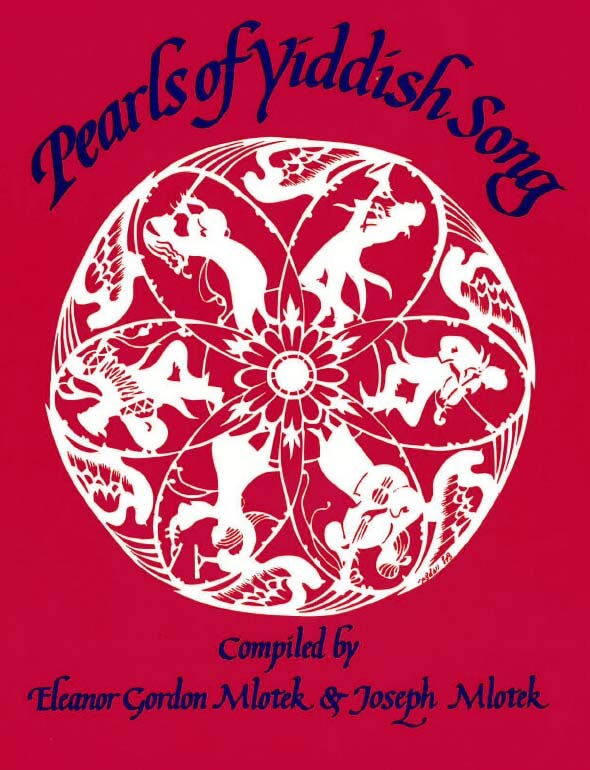Words by Moyshe Korman (1884-1928); music by Mikhl Gelbart (1889-1966). Published in sheet music by Jos. P. Katz, N.Y., 1924. The song was popular in Yiddish schools in the United States and Poland in the 1930’s.

In a poor little house, every evening at the fireplace, a mother spins dreams for her child. She sings him a song and he claps his hands. The whole room sings, even the walls sing along:
Clap hands, my treasure, my beauty! Pappa will buy you shoes, my little one. Mamma will knit you socks. Pappa will buy you horses and Mamma will put bells on them.
In the house happiness and joy reign. Side by side with poverty, paradise resides. There love is greater than anything else. There love is stronger than poverty.
In an orem shtibele,
Ovnt-tsayt baym koymen;
Shpint a libe muter dort
Far dem kind irs troymen;
Zingt zi im a lidele,
Patsht er mit di hentlekh;
Zingt dos gantse shtibele,
Zingen mit di ventlekh:
Refrain:
Patshe, patshe, kikhelekh,
Oytserl, mayn sheyner;
Tate’t koyfn shikhelekh
Zunele, mayn kleyner.
Tate’t koyfn shikhelekh,
Mame’t shtrikn zeklekh;
Tate’t koyfn ferdelekh —
Mame’t onton gleklekh.
Ot azoy in shtibele
Hersht i gllk, i freydn,
Zayt bay zayt mit oremkeyt
Voynt dort a gan-eydn.
Greser iz di libe dort,
Greser iber ales;
Shtarker iz di libe dort,
Shtarker fun dem dales.
אין אַן אָרעם שטיבעלע,
אָװנט־צײַט בײַם קױמען;
שפּינט אַ ליבע מוטער דאָרט
פֿאַר דעם קינד אירס טרױמען;
זינגט זי אים אַ לידעלע,
פּאַטשט ער מיט די הענטלעך,
זינגט דאָס גאַנצע שטיבעלע,
זינגען מיט די װענטלעך:
רעפֿרײן:
פּאַטשע, פּאַטשע, קיכעלעך,
אוצרל, מײַן שײנער;
טאַטע ט’קױפֿן שיכעלעך,
זונעלע, מײַן. קלײנער.
טאַטע ט’קױפֿן שיכעלעך,
מאַמע ט’שטריקן זעקלעך;
טאַטע ט’קױפֿן פֿערדעלעך —
מאַמע ט’אָנטאָן גלעקלעך.
אָט אַזױ אין שטיבעלע
הערשט אי גליק, אי פֿרײדן,
זײַט בײַ זײַט מיט אָרעמקײט
װױנט דאָרט אַ גן־עדן.
גרעסער איז די ליבע דאָרט,
גרעסער איבער אַלעס;
שטאַרקער איז די ליבע דאָרט,
שטאַרקער פֿון דעם דלות.
Song Title: In An Orem Shtibele

First published in 1988 as Pearls of Yiddish Song: Favorite Folk, Art and Theatre Songs, this anthology contains 115 songs. Some material had never been published, while others, included in rare song collections or sheet music, were largely inaccessible. The songs presented reflect Jewish life in Eastern Europe and the United States and depict childhood, love, family celebrations, poverty, work and struggle. There are also songs from the Hasidic and Maskilic movements, songs of Zion and of America, as well as songs from the Yiddish theater.
The title of this anthology derives from the weekly two-page feature column “Pearls of Yiddish Poetry,” which the compilers Yosl and Chana Mlotek initiated in 1970 in the Yiddish newspaper Der Forvertz (the Yiddish Daily Forward). Hundreds of readers from around the world — including authors, composers, singers, actors — became co-participants in this collective folk project and recalled melodies, lines, fragments, stanzas and their variants of songs, poems, and plays which they had heard in their youth. At first, readers sent in only written material. Later, they also taped songs on cassettes, many of whose melodies had, until then, never been recorded. They also identified and supplied missing information regarding lyricists, poets, and composers and described the circumstances surrounding the songs’ origins, their dissemination, diffusion and impact.